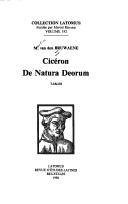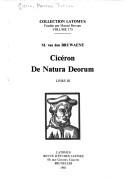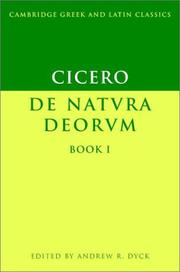| Listing 1 - 9 of 9 |
Sort by
|
Book
ISBN: 3760815243 9783760815244 Year: 1987 Publisher: München : Artemis,
Abstract | Keywords | Export | Availability | Bookmark
 Loading...
Loading...Choose an application
- Reference Manager
- EndNote
- RefWorks (Direct export to RefWorks)
Götter. --- Philosophie. --- Cicero, Marcus Tullius. --- De natura deorum.

ISBN: 287031132X 9782870311325 Year: 1986 Volume: 192 Publisher: Bruxelles: Latomus,
Abstract | Keywords | Export | Availability | Bookmark
 Loading...
Loading...Choose an application
- Reference Manager
- EndNote
- RefWorks (Direct export to RefWorks)
Cicero, Marcus Tullius --- Cicéron --- Latijnse letterkunde --- Littérature latine --- #GOSA:V.Oud.Cic.M --- Cicero (Marcus Tullius). De natura deorum. Index. --- Cicéron. De natura deorum. --- Cicéron. De natura deorum. Index. --- Cicero (Marcus Tullius). De natura deorum. --- Ciceron (106-43 av. j-c.) --- Litterature latine --- De naturadeorum --- Critique et interpretation

ISBN: 2870310048 287031115X 9782870310045 9782870311158 287031132X Year: 1981 Volume: 107/154/175 Publisher: Bruxelles: Latomus,
Abstract | Keywords | Export | Availability | Bookmark
 Loading...
Loading...Choose an application
- Reference Manager
- EndNote
- RefWorks (Direct export to RefWorks)
Gods, Roman --- #GOSA:V.Oud.Cic.O --- Roman gods --- Cicéron --- Philosophy --- Theology --- Christian theology --- Theology, Christian --- Mental philosophy --- Christianity --- Religion --- Humanities --- Classical Latin literature --- Natural theology --- Gods, Roman - Early works to 1800 --- Theology - Early works to 1800 --- Littérature latine. --- Latin literature. --- Cicéron, --- Critique et interprétation. --- Cicero (Marcus Tullius). De natura deorum. Index. --- Cicéron. De natura deorum. --- Cicéron. De natura deorum. Index. --- Latijnse letterkunde --- Cicero, Marcus Tullius --- Cicero (Marcus Tullius). De natura deorum.
Book
ISBN: 8888784098 9788888784090 Year: 2003 Volume: 208 Publisher: Genova: Università di Genova. D.AR.FI.CL.ET,
Abstract | Keywords | Export | Availability | Bookmark
 Loading...
Loading...Choose an application
- Reference Manager
- EndNote
- RefWorks (Direct export to RefWorks)
Book
ISBN: 3161564413 3161500725 9783161564413 Year: 2009 Publisher: Mohr Siebeck
Abstract | Keywords | Export | Availability | Bookmark
 Loading...
Loading...Choose an application
- Reference Manager
- EndNote
- RefWorks (Direct export to RefWorks)
Die vorliegende erste vollständige Übersetzung von "Die Griechischen Götter" des Philosophen Lucius Annaeus Cornutus stellt ein ebenso einzig- wie eigenartiges Handbuch der stoischen allegorischen Götterdeutung dar, das Namen und Attribute der Götter sowie Aspekte der mit ihnen verbundenen Mythen, Riten und bildlichen Darstellungen mit Hilfe einer entwickelten Philosophie interpretiert.
Religion
---
History / Ancient
---
Religion, Primitive
---
Atheism
---
Irreligion
---
Religions
---
Theology
---
Cornutus, Lucius Annaeus,
---
Cornutus, Lucius Annaeus.
---
Criticism and interpretation.
---
De natura deorum.
---
Griechenland

ISBN: 0521006309 0521803608 0521803601 9780521803601 9780521006309 9780511803628 0511803621 Year: 2003 Volume: *12 Publisher: Cambridge Cambridge University Press
Abstract | Keywords | Export | Availability | Bookmark
 Loading...
Loading...Choose an application
- Reference Manager
- EndNote
- RefWorks (Direct export to RefWorks)
Book 1 of De Natura Deorum exhibits in a nutshell Cicero's philosophical method, with the prior part stating the case for Epicurean theology, the latter (rather longer) part refuting it. Thus the reader observes Cicero at work in both constructive and skeptical modes as well as his art of characterizing speakers. Prefaced to the Book is Cicero's most elaborate justification of his philosophical writing. The Book thus makes an ideal starting point for the study of Cicero's philosophica or indeed of any philosophical writing in Latin, since it delineates the problems such a project raised in the minds of Roman readers and shows how Cicero thought they could be met. There is also a systematic and detailed doxography of ancient views about the deity, an important document in itself, presented from an Epicurean perspective. The volume's Introduction situates this text within Cicero's intellectual development and ancient reflection about the gods.
Gods, Roman --- Theology --- Dieux romains --- Théologie --- Early works to 1800. --- Ouvrages avant 1800 --- Cicero, Marcus Tullius --- Cicero, Marcus Tullius, --- Cicero, Marcus Tullius. --- Théologie --- Gods [Roman ] --- Early works to 1800 --- Gods [Greek ] --- Religion --- Gods, Roman. --- Philosophy --- Philosophy. --- Discursos latinos --- Oratoria antigua. --- Retórica antigua. --- Historia y crítica. --- Cicerón, Quinto Tulio, --- Crítica e interpretación. --- Arts and Humanities --- History --- Gods, Roman - Early works to 1800. --- Theology - Early works to 1800 --- Cicero, Marcus Tullius, - 106 B.C.-43 B.C.. - De natura deorum. --- Religion, Primitive --- Atheism --- Irreligion --- Religions --- Cicero, Marcus Tullius, 106 B.C.-43 B.C.
Book
ISBN: 1107070481 9781107070486 1108763030 1107707420 9781107707429 9781107683563 1108627277 1107683564 Year: 2019 Publisher: Cambridge Cambridge University Press
Abstract | Keywords | Export | Availability | Bookmark
 Loading...
Loading...Choose an application
- Reference Manager
- EndNote
- RefWorks (Direct export to RefWorks)
During the months before and after he saw Julius Caesar assassinated on the Ides of March, 44 BC, Cicero wrote two philosophical dialogues about religion and theology: On the Nature of the Gods and On Divination. This book brings to life his portraits of Stoic and Epicurean theology, as well as the scepticism of the new Academy, his own school. We meet the Epicurean gods who live a life of pleasure and care nothing for us, the determinism and beauty of the Stoic universe, itself our benevolent creator, and the reply to both that traditional religion is better served by a lack of dogma. Cicero hoped that these reflections would renew the traditional religion at Rome, with its prayers and sacrifices, temples and statues, myths and poets, and all forms of divination. This volume is the first to fully investigate Cicero's dialogues as the work of a careful philosophical author.
1 <37> CICERO, MARCUS TULLIUS --- 1 <37> CICERO, MARCUS TULLIUS Romeinse filosofie--CICERO, MARCUS TULLIUS --- Romeinse filosofie--CICERO, MARCUS TULLIUS --- Religion --- Stoics --- Epicureans (Greek philosophy) --- Divination --- Philosophy --- Cicero, Marcus Tullius. --- De divinatione (Cicero, Marcus Tullius) --- De natura deorum (Cicero, Marcus Tullius) --- Cicero, Marcus Tullius --- T︠S︡it︠s︡eron, Mark Tulliĭ --- Cyceron --- Cicéron --- Kikerōn --- Cicerón, M. Tulio --- Ḳiḳero --- Cicerone --- M. Tulli Ciceronis --- Cicéron, Marcus --- Cicerón, Marco Tulio --- Ḳiḳero, Marḳus Ṭulyus --- Tullius Cicero, Marcus --- Cicerone, M. T. --- Kikerōn, M. T. --- Cicerone, M. Tullio --- Cicero --- Cicero, M. T. --- Cyceron, Marek Tulliusz --- ציצרון, מארקוס טולליוס --- קיקרו, מארקוס טוליוס --- קיקרו, מרקוס טוליוס --- キケロ --- 西塞罗 --- Religion.
Book
ISBN: 9783515130264 9783515130295 3515130292 3515130268 Year: 2021 Volume: 128 Publisher: Stuttgart: Franz Steiner,
Abstract | Keywords | Export | Availability | Bookmark
 Loading...
Loading...Choose an application
- Reference Manager
- EndNote
- RefWorks (Direct export to RefWorks)
"Wollte Cicero mit seinen philosophischen Dialogen seiner römischen Leserschaft lediglich einen Überblick über die antike Philosophiegeschichte verschaffen - oder verfolgte er eine eigenständige philosophische Zielsetzung? Dass Ciceros Philosophica mehr sein wollen als eine blosse Übersetzung der griechischen Originale, weist Christopher Diez am Beispiel von Ciceros religionsphilosophischem Hauptwerk De natura deorum nach. Gerade an De natura deorum lässt sich zeigen, dass der Skeptiker Cicero seine Leserschaft zu einer selbstständigen Untersuchung der einzelnen philosophischen Positionen anleiten wollte. Die Gattung des Dialogs stellt für Cicero die geeignete literarische Form für sein philosophisches Programm dar. Mithilfe von direkter und indirekter Leserführung befähigt Cicero seine Rezipienten dazu, die einzelnen, komplementär modellierten Redebeiträge kritisch auf ihre epistemologische und kultische Tragfähigkeit zu prüfen. Cicero erscheint hier als ein Autor, der eine Vermittlung divergierender Sprach-, Denk- und Kulträume anbahnen und seine Rezipienten dabei unterstützen wollte, ein eigenständiges Urteilsvermögen auszubilden."--Page 4 of cover
E-books --- Skepsis --- Rhetorik --- Rezeptionsästhetik --- Rede --- Götter --- Aristotelismus --- Philosophie --- Cicero, Marcus Tullius --- (Produktform)Electronic book text --- Cicero --- Ciceros Eigenbeitrag --- Ciceros literarische Leistung --- Ciceros philosophische Leistung --- De natura deorum --- Dialog --- Dialogizität --- Klassische Philologie --- Leseraktivierung --- Literatur und Philosophie --- Quellenforschung --- Religionsphilosophie --- emanzipatorische Leserführung --- gemäßigte Skepsis --- komplementäre Reden --- literarische Philosophie --- philosophische Literatur --- rhetorical approach --- römische Philosophie --- skeptische Philosophie --- (VLB-WN)9567 --- Philosophieren --- Philosoph --- Philosophin --- Neuaristotelismus --- Neoaristotelismus --- Akt --- Potenz --- Aristoteles --- Zweifel --- Skeptizismus --- Gottheiten --- Übernatürliches Wesen --- Gott --- Göttin --- Ansprache --- Redner --- Vortragstechnik --- Rezeptionstheorie --- Wirkungsästhetik --- Kunstwerk --- Literaturtheorie --- Ästhetik --- Rezeption --- Beredsamkeit --- Redekunst --- Redetechnik --- Cicero, Marcus T. --- Cicero, M. Tullus --- Cicero, Marcus Tullus --- Cicero, Markus Tullius --- Cicero, M. T. --- Ciceron, Marcus Tullius --- Ciceron, Marcus T. --- Cicéron, Marcus T. --- Cicerón, Marco Tulio --- Ciceron, Marco T. --- Ciceron, Mark Tullij --- Cicerone, Marco T. --- Cicerone, Marcus T. --- Cic., Marcus Tullius --- Ciccero, Marcus Tullius --- Kikerō, Markos Tyllios --- Kikero, Markos Tyllios --- Tullius, Marcus --- Cycero, Marek T. --- Xi, Sailuo --- Cecéron --- Cicéron --- Ciceron --- Pseudocicero --- Pseudo Cicero --- Pseudo Ciccero --- Tullius --- Tully --- M.T.C. --- M. T. C. --- Cyceron --- 西塞罗 --- 西, 塞罗 --- Xi sai luo --- Xisailuo --- Cicero, M. Tullius --- Cicerone, Marco Tullio --- Tullius Cicero, Marcus --- Cicerone --- Pseudo-Cicero --- Marcus Tullius Cicero --- Pseudo-Cicerone --- Cicéron, Marcus Tullius --- Cicjeron, Mark Tullij --- Politiker --- Schriftsteller --- Rechtsanwalt --- Arpino --- Rom --- Formia --- Cicero, Quintus Tullius --- v106-v43 --- 03.01.v106-07.12.v43 --- v01 --- -v00 --- -Cicero, Marcus Tullius --- -(Produktform)Electronic book text --- Cicero, Marcus Tullius. --- Criticism and interpretation. --- De natura deorum (Cicero, Marcus Tullius)
Book
ISBN: 9780691153322 0691153329 9786613589743 1400842166 1280494514 9781400842162 9781280494512 0691264821 Year: 2012 Publisher: Princeton, NJ : Princeton University Press,
Abstract | Keywords | Export | Availability | Bookmark
 Loading...
Loading...Choose an application
- Reference Manager
- EndNote
- RefWorks (Direct export to RefWorks)
In the 40s BCE, during his forced retirement from politics under Caesar's dictatorship, Cicero turned to philosophy, producing a massive and important body of work. As he was acutely aware, this was an unusual undertaking for a Roman statesman because Romans were often hostile to philosophy, perceiving it as foreign and incompatible with fulfilling one's duty as a citizen. How, then, are we to understand Cicero's decision to pursue philosophy in the context of the political, intellectual, and cultural life of the late Roman republic? In A Written Republic, Yelena Baraz takes up this question and makes the case that philosophy for Cicero was not a retreat from politics but a continuation of politics by other means, an alternative way of living a political life and serving the state under newly restricted conditions. Baraz examines the rhetorical battle that Cicero stages in his philosophical prefaces--a battle between the forces that would oppose or support his project. He presents his philosophy as intimately connected to the new political circumstances and his exclusion from politics. His goal--to benefit the state by providing new moral resources for the Roman elite--was traditional, even if his method of translating Greek philosophical knowledge into Latin and combining Greek sources with Roman heritage was unorthodox. A Written Republic provides a new perspective on Cicero's conception of his philosophical project while also adding to the broader picture of late-Roman political, intellectual, and cultural life.
Philosophy, Ancient. --- Cicero, Marcus Tullius --- Political and social views. --- Rome --- Politics and government --- Philosophie ancienne --- Politique et gouvernement --- Ancient philosophy --- Greek philosophy --- Philosophy, Greek --- Philosophy, Roman --- Roman philosophy --- Cicero --- Cicerone, M. T. --- Cicéron, Marcus --- Philosophy, Ancient --- M. Tulli Ciceronis --- T︠S︡it︠s︡eron, Mark Tulliĭ --- Cyceron --- Cicéron --- Kikerōn --- Cicerón, M. Tulio --- Ḳiḳero --- Cicerone --- Cicerón, Marco Tulio --- Ḳiḳero, Marḳus Ṭulyus --- Tullius Cicero, Marcus --- Kikerōn, M. T. --- Cicerone, M. Tullio --- Cicero, M. T. --- Cyceron, Marek Tulliusz --- ציצרון, מארקוס טולליוס --- קיקרו, מארקוס טוליוס --- קיקרו, מרקוס טוליוס --- キケロ --- 西塞罗 --- Academic Skepticism. --- Bellum Catilinae. --- Bellum Iugurthinum. --- Cato the Younger. --- Cicero. --- De Divinatione. --- De Finibus. --- De Natura Deorum. --- De Officiis. --- De Senectute. --- Ennius. --- Julius Caesar. --- Marcus the Younger. --- Paradoxa Stoicorum. --- Quintus Cicero. --- Rhetorica ad Herennium. --- Roman elite. --- Sallust. --- Topica. --- Tullia. --- Tusculan Disputations. --- action. --- amicitia. --- character. --- civil war. --- cultural life. --- dedicatees. --- dictatorship. --- intellectual activity. --- intellectual life. --- late Roman republic. --- letters. --- mos maiorum. --- negotium. --- oratory. --- otium. --- patriotism. --- philosophical writings. --- philosophy. --- political life. --- politics. --- prefaces. --- public life. --- readers. --- rhetoric. --- translation. --- treatises. --- volumen prohoemiorum.
| Listing 1 - 9 of 9 |
Sort by
|

 Search
Search Feedback
Feedback About UniCat
About UniCat  Help
Help News
News